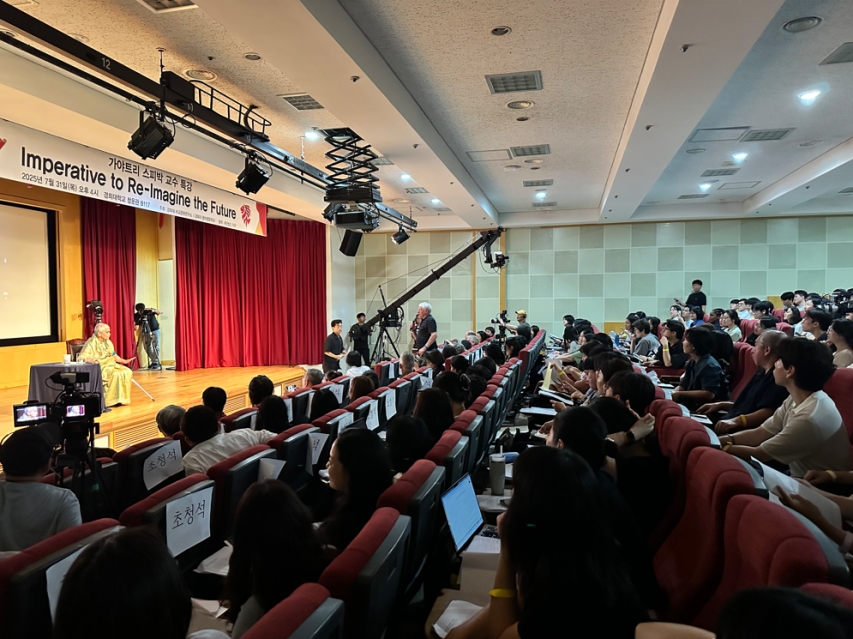[Campus] Holberg Prize Winner Gayatri C. Spivak Delivers Lecture on “Imperative to Re-imagine the Future”
Prof. Spivak addressing her audience during the special lecture at KHU, July 31. |
Kyung Hee University (KHU) hosted Professor Gayatri Chakravorty Spivak for a special lecture titled “Imperative to Re-imagine the Future” on July 31. The professor explained her vision of a proper future and discussed ways to achieve it with participants. Her reputation as a renowned postcolonial intellectual drew a large number of students, faculty, and international guests.
Spivak: Holberg Prize Laureate and the Author of Can the Subaltern Speak?
Prof. Spivak is an Indian scholar who teaches the humanities and is a founding member of the Institute for Comparative Literature and Society at Columbia University. Her research spans diverse fields, including 19th-century British literature, feminism, Marxism, globalization, climate change, and more.
Among her diverse works, she is most recognized for her 1988 publication Can the Subaltern Speak? This essay provides an unprecedented perspective of minority groups in India by examining tragic experiences around the colonial period. The Norwegian embassy in Malaysia referred to her works as “a great source of inspiration to young scholars, particularly from the Global South...a cornerstone of postcolonial subaltern studies.”
Prof. Spivak’s widely recognized works led her to receive the Holberg Prize this year. The prize is supported by the Norwegian Ministry of Education and Research to honor scholars who have made outstanding contributions to research in the humanities, social sciences, law, or theology. The selection committee specifically cited “her groundbreaking work in the fields of literary theory and philosophy” as the reasoning for the award.
Special Lecture at KHU: Making the Impossible Future Possible
Organized by the KHU Center for Cross-Cultural Studies (CCS) and the Dept. of English Language & Literature, Prof. Spivak delivered the special lecture in room B117 in Cheongwoon Building on Seoul Campus. The two-hour lecture was given in English, with written Korean translations provided for the audience.
Prof. Spivak’s key message was to reconsider approaches to global issues differently based on a worldview she developed through experience and research: “Planetarity”. Based on this concept, resolving man-made issues, such as ecological crises and geopolitical conflict around the world, is beyond a superficial struggle to “save the planet.” It is a direct struggle for human beings to save ourselves.
Under these circumstances, Prof. Spivak argued for revising current approaches to solving global problems. She explained that the current imperative is to “rearrange human desires so that we learn to want differently.” According to her, this can be achieved through system change: better pedagogies, plans of action, and equitable social systems.
Prof. Spivak also emphasized the importance of engaging with the subaltern population while doing so. The subaltern are small communities excluded from the world’s hierarchy in social, political, or geographical terms. Because these marginalized groups are also the ones impacted the most by current issues, she stressed that understanding and empowering them are key actions humanity must take.
Translation Controversy, Yet a Positive Reception at KHU
After her lecture at KHU, Prof. Spivak flew to Jeju Island to give another speech for the 2025 Critical Island Studies Conference. Some controversies were sparked at the event due to Korean translations not being provided. Critics condemned the event management for disrespecting the audience, especially when options such as artificial intelligence (AI) simultaneous translation were readily available.
Regarding the complaints, Kim Jae-in, a research professor at the CCS, explained several reasons behind the decision. He noted that the lecture was originally intended for expert audiences and that Prof. Spivak continued revising the script until the day before the lecture, which meant a thorough translation could not be prepared. Moreover, since Prof. Spivak was skeptical about using AI to convey complex and nuanced content in the humanities, the organizers ultimately decided not to provide translations.
Despite these recent issues, Prof. Spivak’s lecture at KHU was regarded as a profound opportunity. Prof. Kim Ji-eun of the CCS, who was heavily involved in organizing the event, noted: “Originally, Prof. Spivak’s visit was only for the global academic exchange scheduled at Jeju. But with coordination between the CCS and the Dept. of English Language & Literature, KHU had the opportunity to host this special lecture.”
Prof. Spivak’s lecture resonated with KHU’s stated mission to cultivate mature, society-oriented members of the global community. Her lecture offered perspectives beyond current paradigms, as well as valuable insights into future directions. July’s visit was thus a meaningful opportunity for the KHU community to reflect upon academic approaches shaped by familiar viewpoints.
There are no registered comments.
I agree to the collection of personal information. [view]


